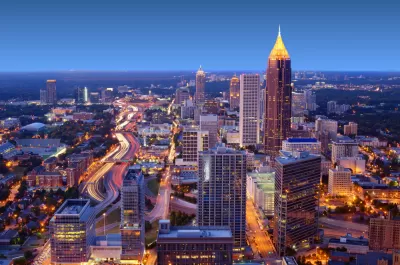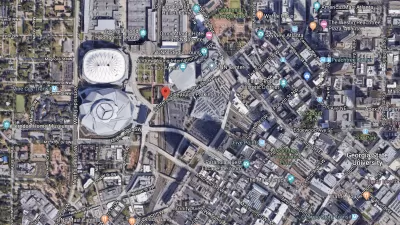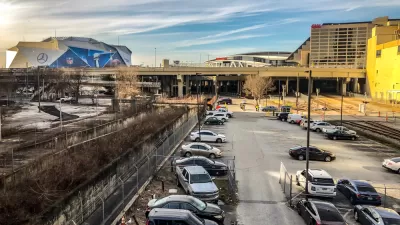The city of Atlanta has approved its largest development project since the 1960s.

"After more than 10 hours of debate and deliberation on Monday, the Atlanta City Council approved nearly $1.9 billion in public subsidies for a downtown development that will permanently reshape the city’s skyline," reports Dan Klepal.
The Gulch development, as the planned mega-project is called, will total $5 billion in investment, "[creating] a forest of office towers, residences, hotels and retail space on 40 acres that stretch from the CNN Center to the Richard B. Russell Federal Courthouse."
The victory comes as a major victory for first-year Mayor Keisha Bottoms, who supported the project.
Still:
The project polarized much of the community: Supporters see it as an investment in jobs, affordable housing and economic development, while critics complain the project was rushed through without sufficient public input and will further income inequality and gentrification.
Julian Bene, an opponent of the plan who previously served on the Invest Atlanta board, said Bottoms and project supporters on the city council will be long gone when the cost of the plan hits home.
More details on the subsidies and approvals the approved ordinances put in motion are included in the source article.
FULL STORY: Atlanta City Council approves $1.9 billion subsidy package for Gulch project

Planetizen Federal Action Tracker
A weekly monitor of how Trump’s orders and actions are impacting planners and planning in America.

Maui's Vacation Rental Debate Turns Ugly
Verbal attacks, misinformation campaigns and fistfights plague a high-stakes debate to convert thousands of vacation rentals into long-term housing.

Cuomo Is the Candidate of Both NIMBYs and Developers. What Gives?
In the New York City mayoral race, odd bedfellows align to preserve the housing status quo.

San Antonio and Austin are Fusing Into one Massive Megaregion
The region spanning the two central Texas cities is growing fast, posing challenges for local infrastructure and water supplies.

Charlottesville Temporarily Has No Zoning Code
A judge ordered the Virginia city to throw out its newly revised zoning code, leaving permitting for new development in legal limbo.

In California Battle of Housing vs. Environment, Housing Just Won
A new state law significantly limits the power of CEQA, an environmental review law that served as a powerful tool for blocking new development.
Urban Design for Planners 1: Software Tools
This six-course series explores essential urban design concepts using open source software and equips planners with the tools they need to participate fully in the urban design process.
Planning for Universal Design
Learn the tools for implementing Universal Design in planning regulations.
Heyer Gruel & Associates PA
JM Goldson LLC
Custer County Colorado
City of Camden Redevelopment Agency
City of Astoria
Transportation Research & Education Center (TREC) at Portland State University
Jefferson Parish Government
Camden Redevelopment Agency
City of Claremont





























